CLEANING A CARAVAN: PRACTICAL TIPS AND ADVICE
For many, caravans or campers are the epitome of freedom. Thanks to them, you always have a roof over your head when on holiday and are totally flexible. Just like cars, campers and caravans require regular cleaning, both outside and inside. After all, dust, rain, leaves, insects and co., as well as everyday life leave its mark on the living space. Here are useful tips and advice on how to clean your caravan or camper.
Why clean a camper and caravan?
The reason why you should clean a camper or caravan are obvious. Firstly, it is a matter of aesthetics and well-being, especially when it comes to the interior. On the other hand, a caravan that has been cleaned from the outside increase’s safety on the road, as dirty rear-view mirrors and windshields can restrict visibility and thus become dangerous. Last but not least, regular cleaning helps to maintain the value of the vehicle. For these reasons, you should clean your caravan thoroughly at least once, preferably twice a year. Ideally in the autumn, when most owners park up their caravan for the winter, and then again in spring, before they go on tour again. But it is also advisable to remove the traces of the last holiday, both inside and out, especially after a very longer tip with the caravan. Windows and mirrors, on the other hand, should be cleaned before each trip if they are dirty.
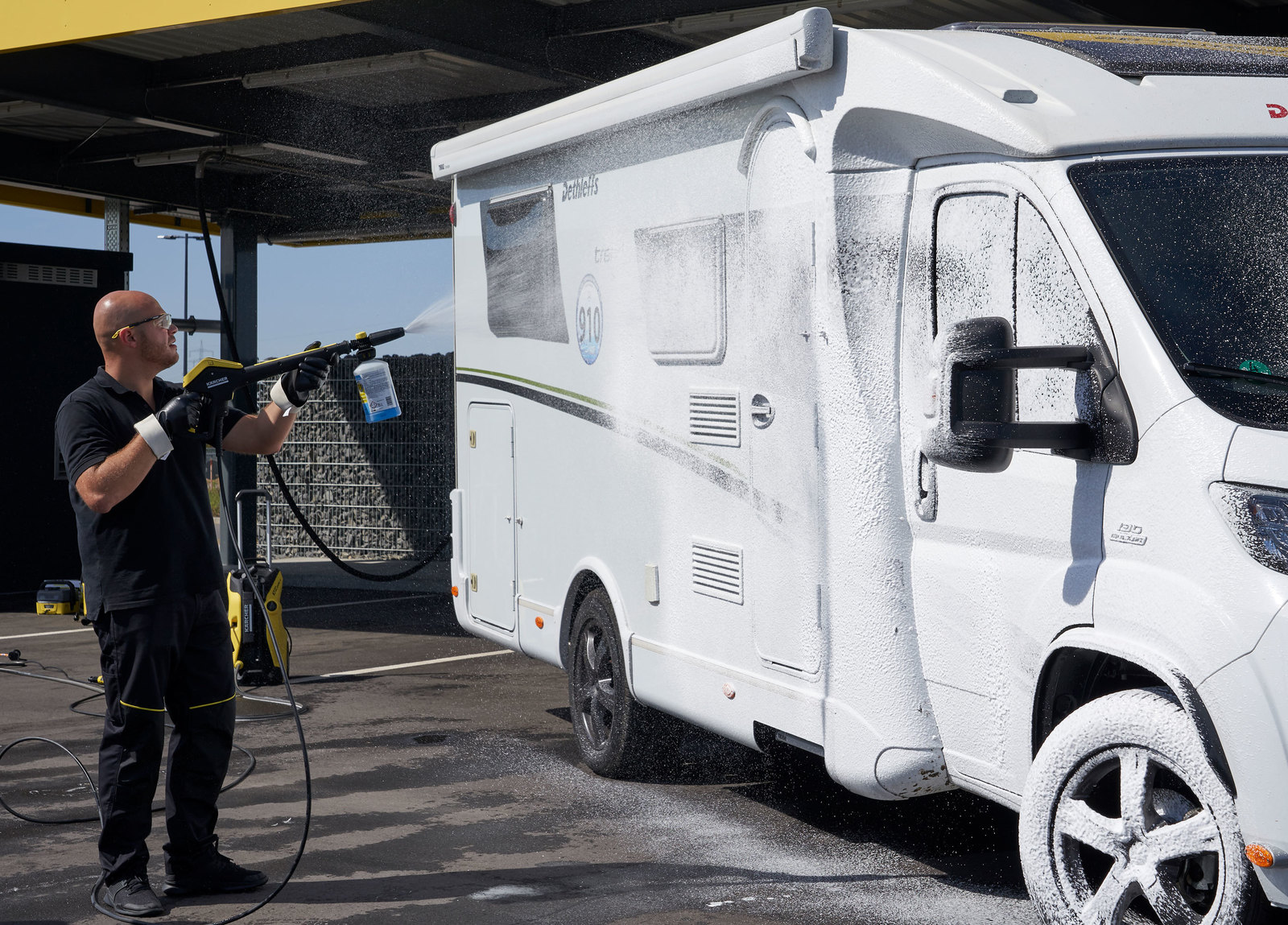
Where should you wash and clean a camper or caravan?
When it comes to cleaning the camper or caravan, the first thing to consider is where to wash it. They can’t be washed anywhere, maybe not even on your property. After all, harmful cleaning agents could end up in the environment in the process. In many places, washing your vehicle on your property is therefore also prohibited. To be on the safe side, It is best to clean your camper or caravan in a designated car wash.
Special self-service washing areas for motorhomes, e.g. in Kärcher Clean Parks are particularly suitable, so you can easily clean your caravan yourself. The wash box for large vehicles has more space, so that your caravan can fit under it as it is over 2 meters high. The brushes in a wash box should always be checked for cleanliness and rinsed briefly with water before use, because small dirt particles on the wash brushes can leave scratches on the sensitive surfaces.
For caravan owners who do not want to do it themselves, car washes for trucks and buses may also be an option. However, it is essential to find out in advance whether the facility is also suitable for caravans. It is also important to read the information provided by the manufacturer, because not every vehicle is suitable for a car wash. Particularly the windows, seals and roof construction may be an issue.
Cleaning caravans and campers step by step
When cleaning campers and caravans, you should consider both the exterior, including awnings, the interior and the water tanks. With the following tips, the cleaning can be done quickly and easily by yourself.
Clean caravan and camper exterior
Once the weather cooperates and you have found a suitable place to clean your camper or caravan, you are ready to go. When cleaning the exterior, the roof should be cleaned first, then the sides and finally the rims. The side of the caravan should always be cleaned from bottom to top. This makes it obvious which areas have already been cleaned, especially when using cleaning products.
To clean the camper or caravan, you can resort to the following tools:
- Car Shampoo, Ultra Foam Cleaner or special caravan and camper cleaners (note: these must not have any abrasive ingredients, as they could damage the exterior)
- Insect remover
- Rim cleaner and rim washing brush
- Car glass cleaner and acrylic cleaner if necessary
- Wash brush and pressure washer; alternatively, a garden hose
- If necessary telescopic jet pipe
- Warm water
- Sponge or cloth
- Microfibre cloth
- Disinfectant
- Disinfecting agent
- Descaling agent
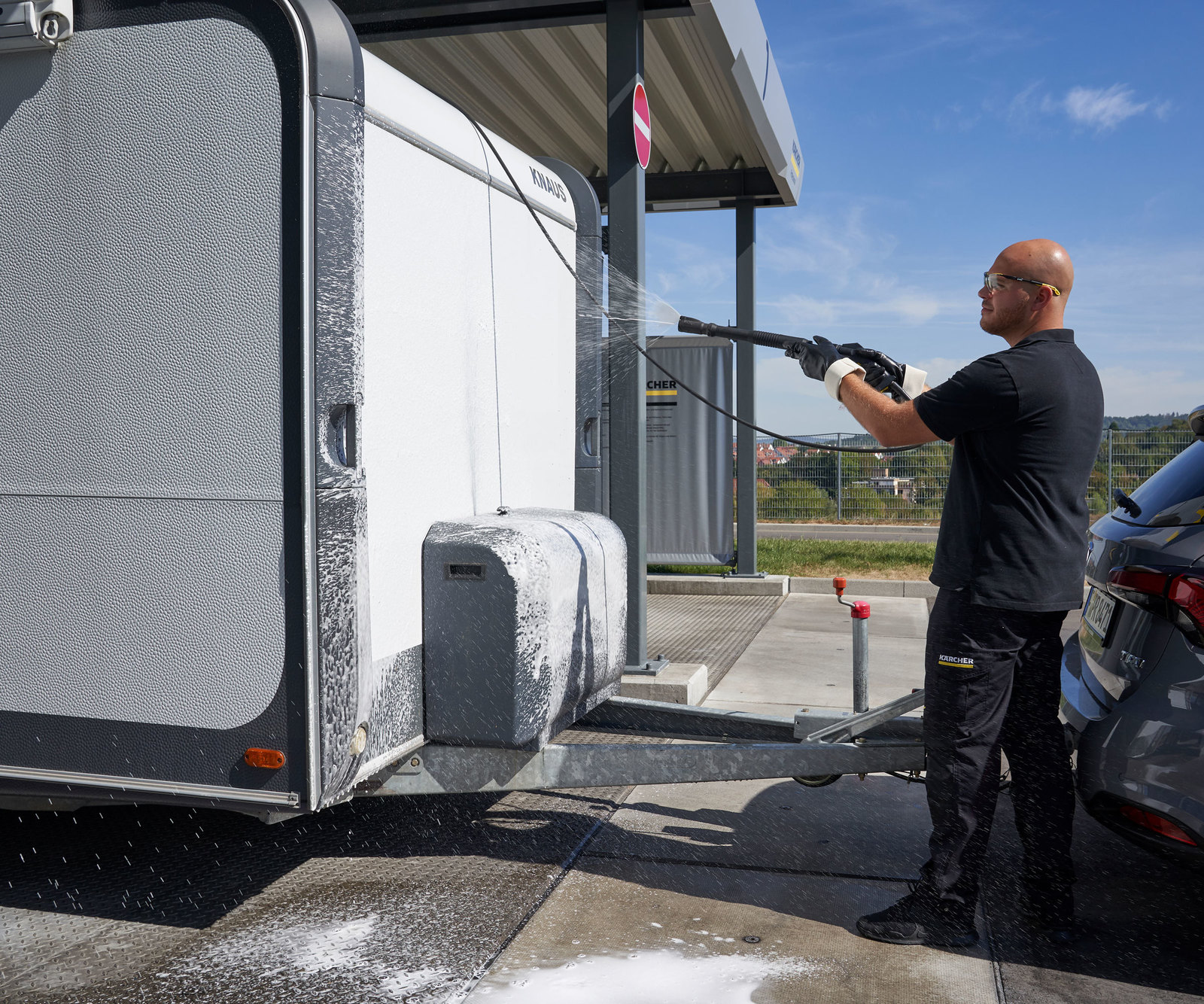
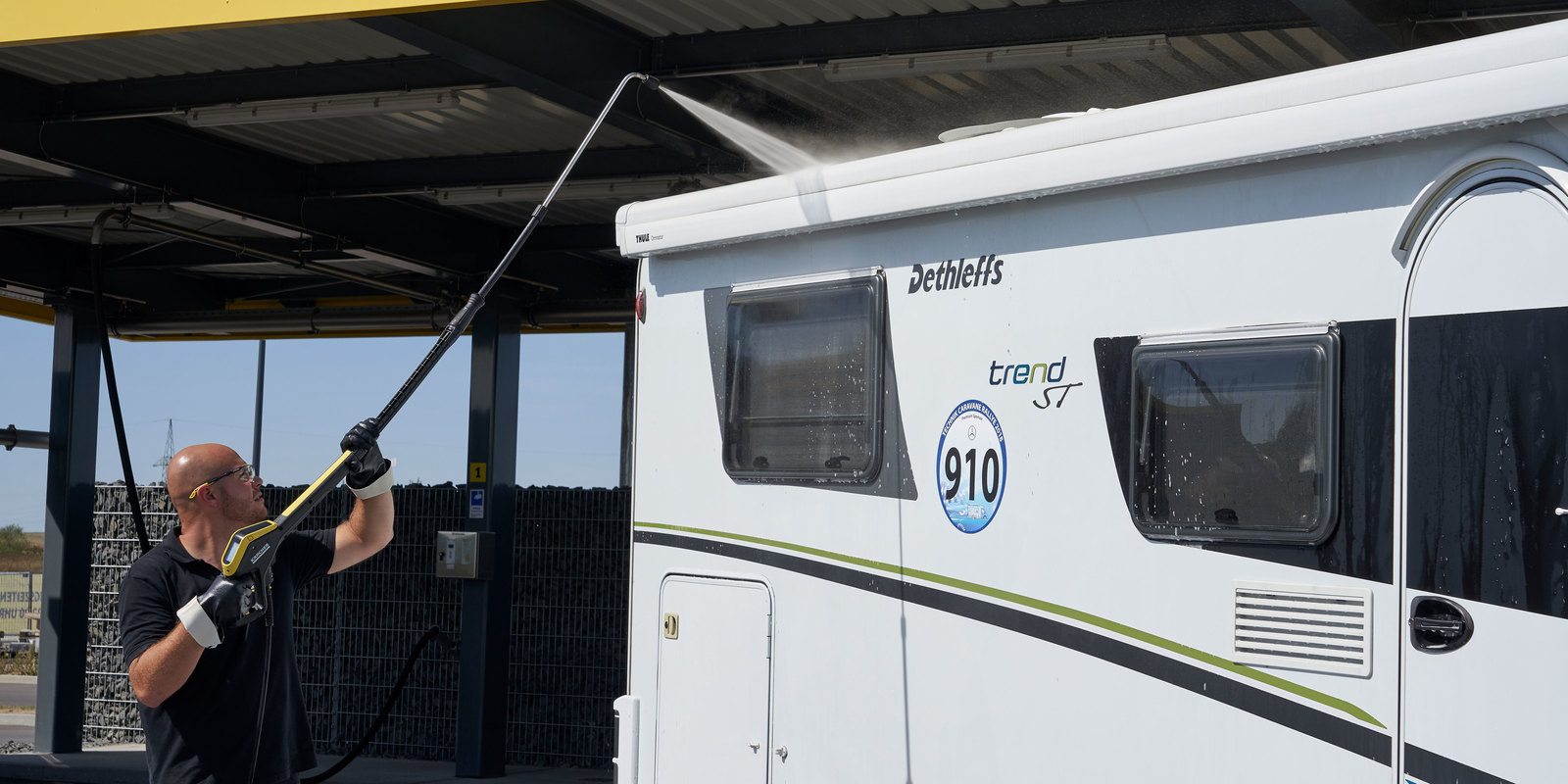
The fastest way to clean the exterior of your caravan is with a pressure washer and a car shampoo. If you want to clean the roof with the pressure washer, you should not stand on top of it or work from a ladder. There is a risk that the ladder could tip over due to the powerful water jet. The safest way is to work from the ground with a telescopic jet pipe There are also scaffolds at some wash stations to help safely clean tall vehicles. When cleaning with high pressure, it is also important to proceed carefully and use the gentlest possible water jet. A minimum distance of 30 cm should also be maintained. Decor, ventilation grilles, and seals should be cleaned separately. To protect the air ducts of the refrigerator, it is recommended to install the winter covers before washing.
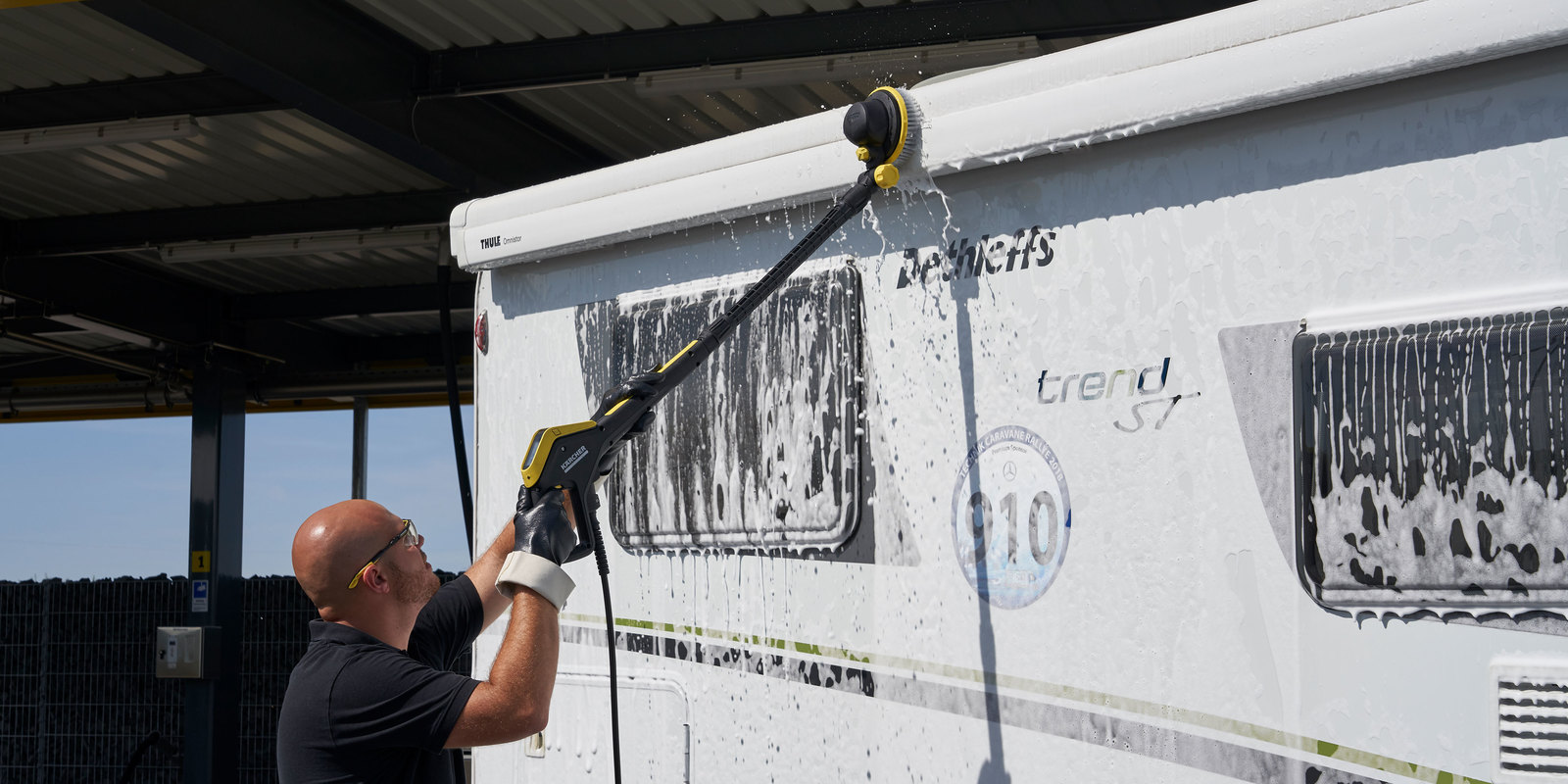
If there is only a ladder available, a foaming cleaner can be used. Wet the roof and sidewalls with a foaming cleaner use a soft wash brush and then rinse with a hose. Gaskets should be avoided and treated with glycerin or talc instead.
To clean the windows, on your vehicle, it's best to use a car glass cleaner. Simply spray on and spread with a clean microfibre cloth. In general, the windows of the living quarters are made of acrylic or plastic. To clean them, there are special acrylic cleaners available. However, they can also be cleaned with a vinegar cleaner. Don’t use a brush when cleaning these windows, as they might scratch. For a streak-free result, you can rinse the windows with water after cleaning and then wipe them dry with a chamois or standard kitchen towel.
Tip
If insect residue sticks to the windows, headlights or the roof of the caravan, the areas can be cleaned with an insect remover and then rinsed off with a pressure washer or a hose.


Wheel wells and rims can also be cleaned with the pressure washer. To clean hard-to-reach areas such as the wheel wells, a variable jet pipe with a 360° joint can be attached to the pressure washer. For rim cleaning, a rim cleaner is recommended. Alternatively, a mixture of lukewarm water and a splash of vinegar can be used. For stubborn dirt, a wheel washing brush is helpful to clean in between the gaps as well.
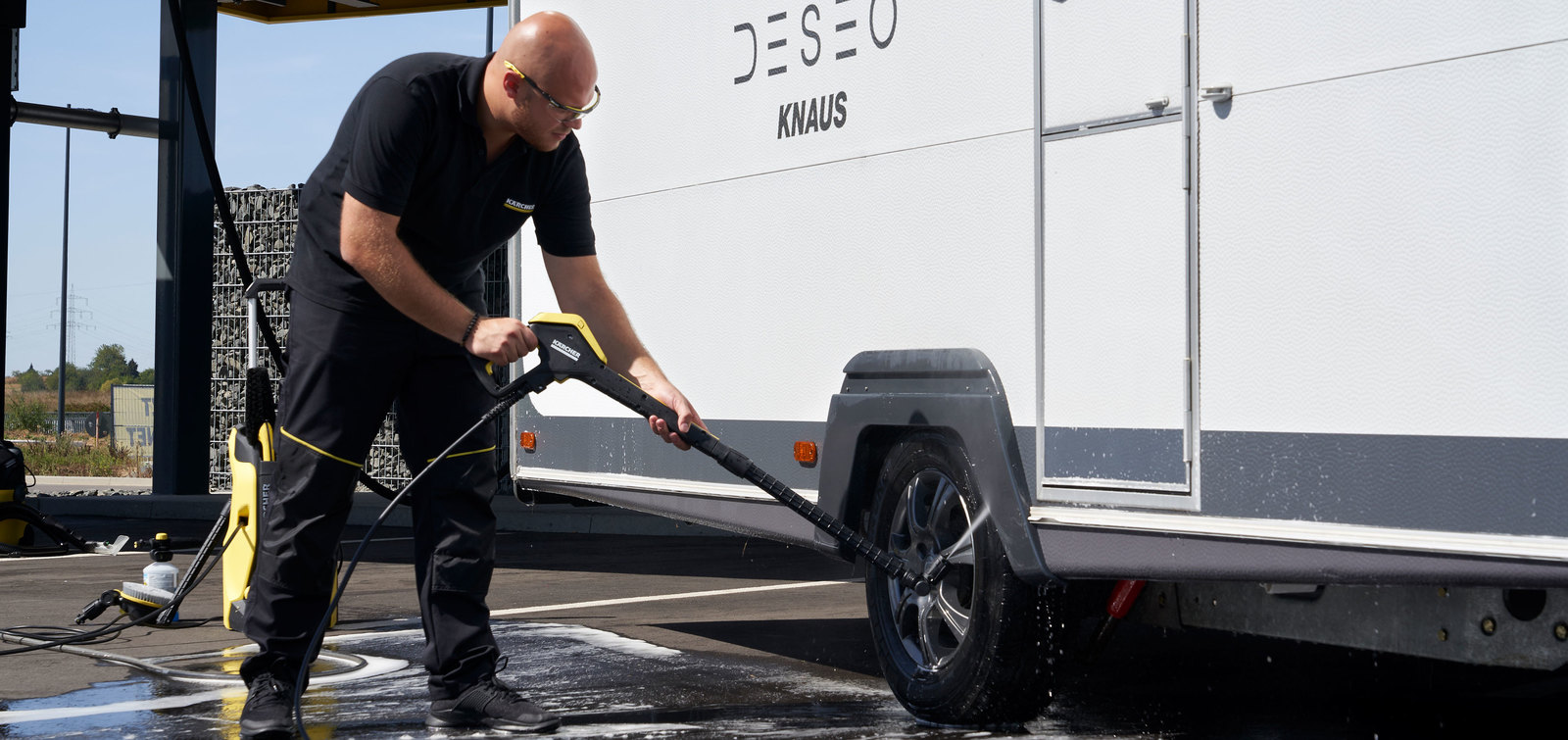
Tip
It makes sense to clean your caravan or camper on dry days. However, you should avoid blazing sunshine, otherwise the cleaning products used will dry too quickly, causing unsightly stains. For the same reason, it makes sense to always clean one side of the camper or caravan completely before moving on to the next.
Clean water tank and awning
The water tanks in the camper or caravan are habitats for microorganisms. Not only should limescale be removed from the water system regularly, but also the so-called biofilm that forms over time and in which bacteria settle. It is a slimy layer on the tank walls and discolouration in the pipes. Water tanks should therefore be cleaned at least once a year, but preferably before and after the camping season. First sterilise, then disinfect and use a descaling agent and rinses the water tank thoroughly afterwards, according to the instructions on the product.
Awnings also need cleaning at regular intervals. With normal contamination, it is sufficient to clean the surface with a little warm water and a brush, cloth, or sponge. If the dirt is more stubborn, mild soapy water or washing up liquid can also be used. The fabric should then dry in the fresh air before the awning is rolled up again or stored away.
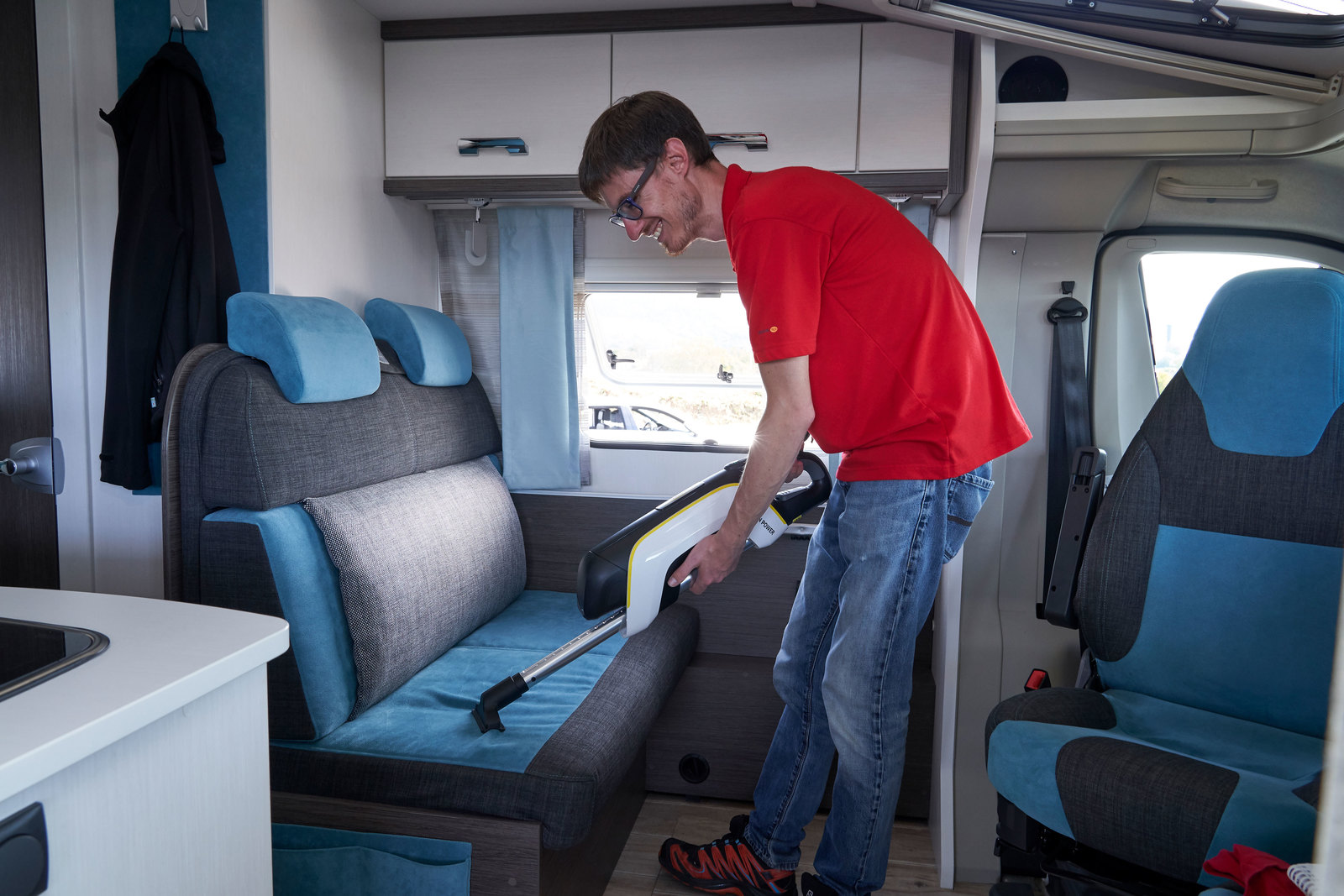
Clean camper and caravan interior
After a thorough exterior cleaning, you can turn your attention to the interior. Before you start to clean the caravan from the inside, you should remove all movable objects and at the opportunity, if necessary, immediately sort out things that you no longer need. Use the following items for cleaning:
- Lukewarm water
- Sponge and cloth
- Household cleaner
- Vacuum cleaner or wet/dry vacuum
- Steam cleaner
- If needed, carpet vacuum cleaner or stain remover
In general, when cleaning the interior, water should be used sparingly, because moisture can quickly lead to mould in a caravan due to its special design and, in the worst case, damage to the chassis. Water residue should always be cleaned up. In addition, it helps to clean with the windows open, so moisture generated by cleaning can escape.
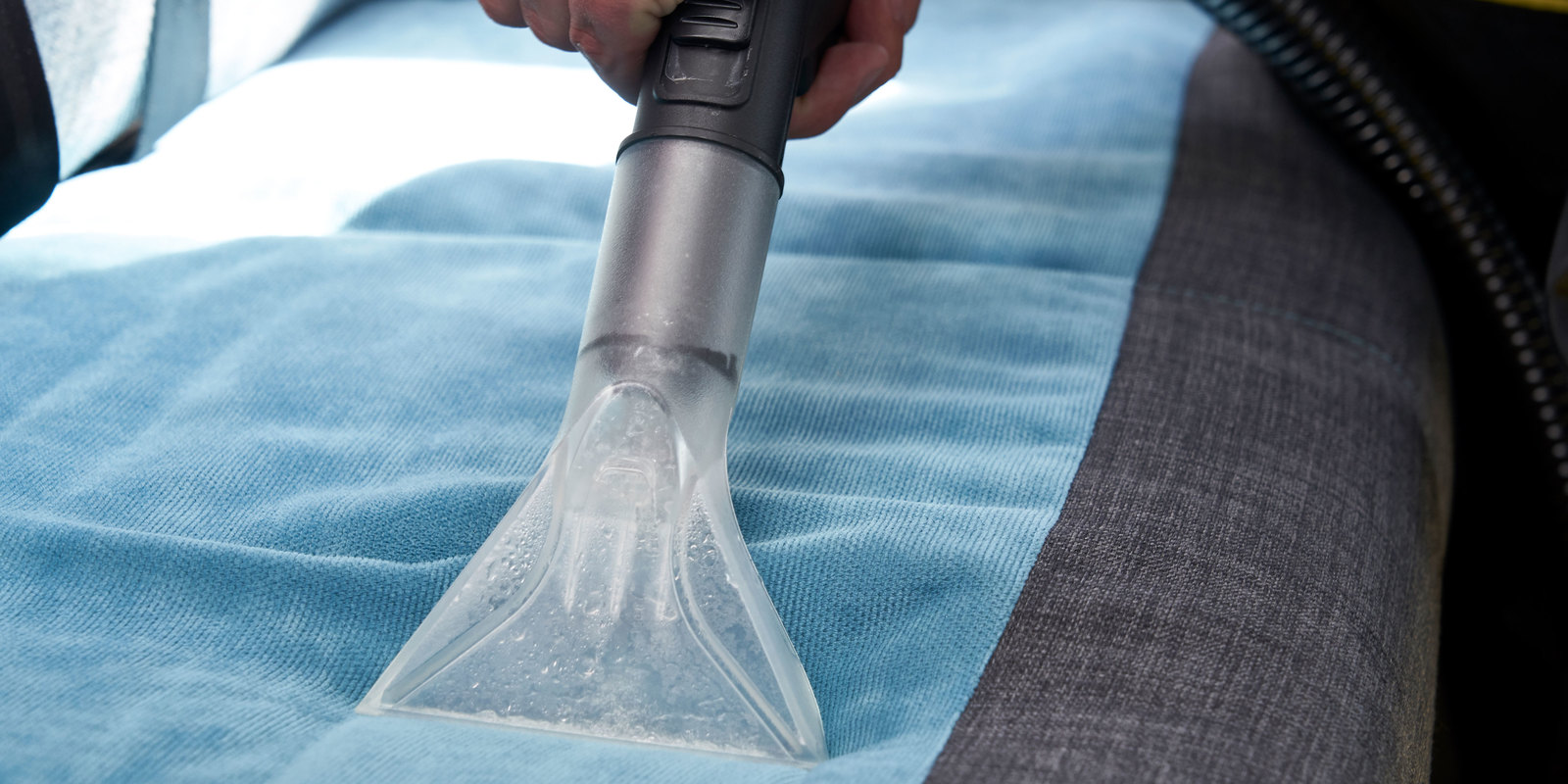
To clean upholstery, mattresses and carpets, vacuum them with the vacuum cleaner or with a wet and dry vacuum cleaner and then let them air dry outside while cleaning. For heavier soiling or stains, a carpet cleaner can be used. Alternatively, spot cleaning stains with a special cleaning product is also possible.
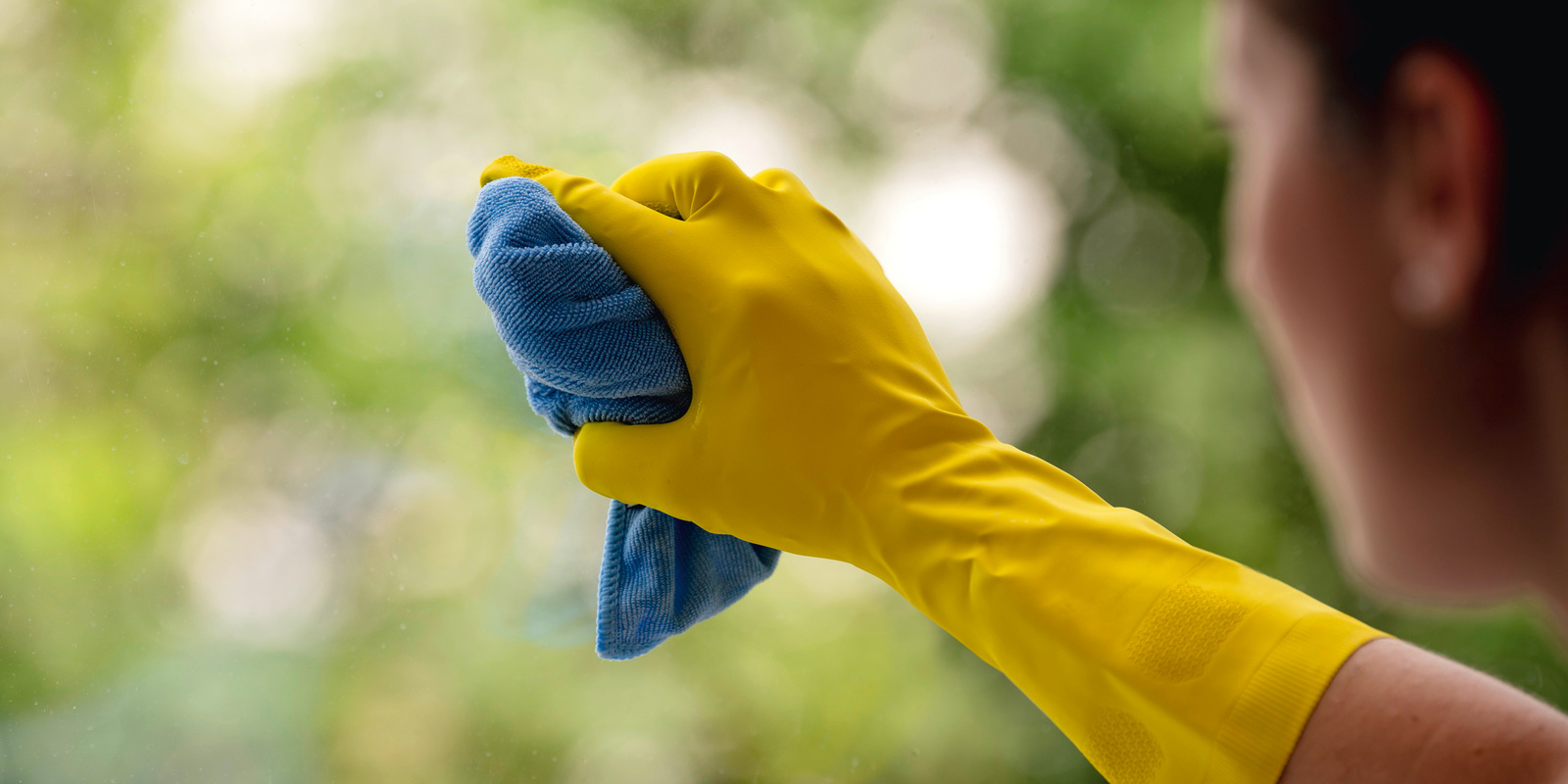
To clean the inside of the windows, follow the same steps as described above. Again, note that different products must be used to clean glass and plastic windows.
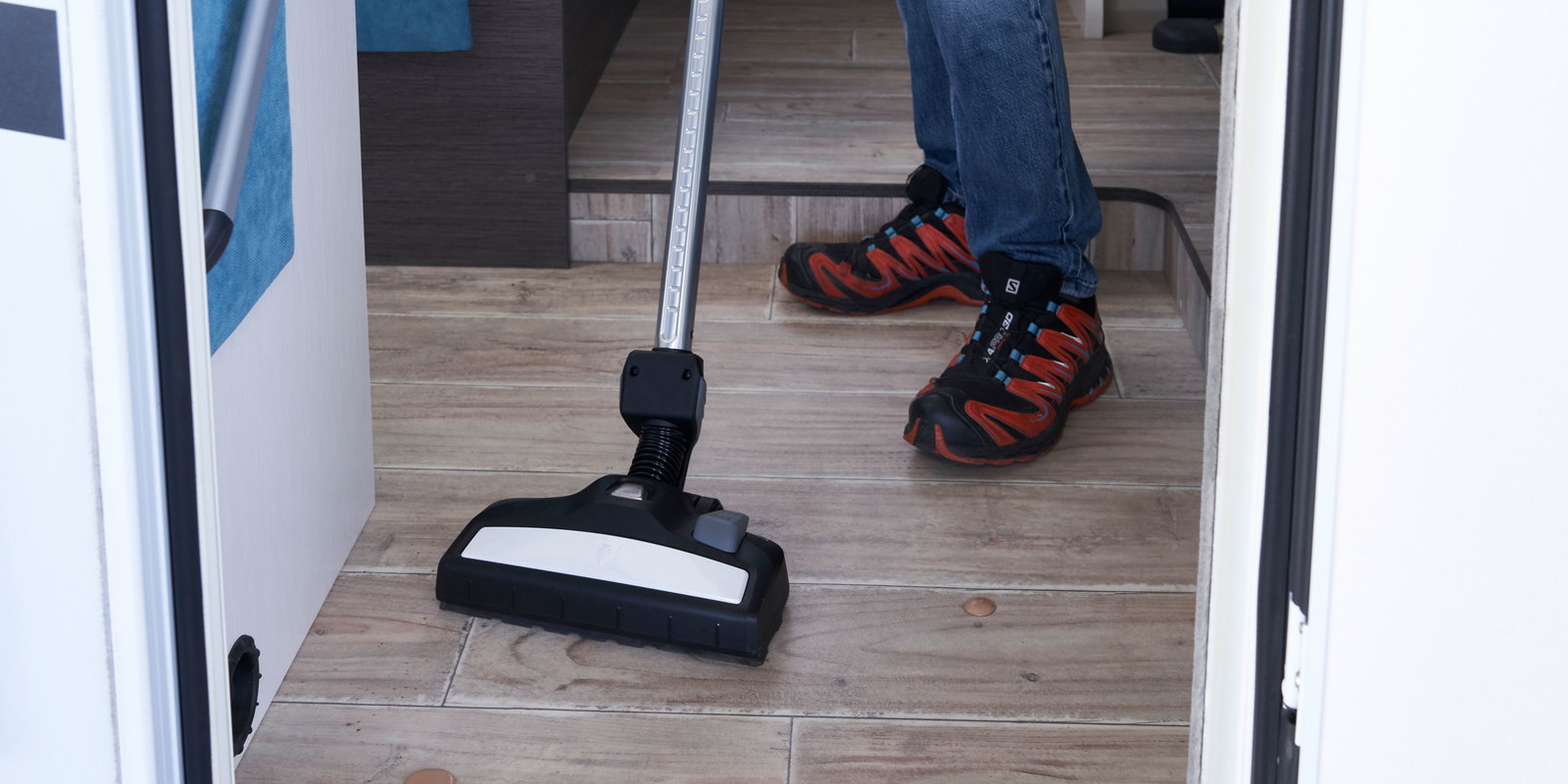
Afterwards vacuum the entire interior thoroughly. In addition to the floor, cabinets and storage spaces should also be cleaned, including compartments and drawers. Then wipe down with a damp cloth. Optionally, a mild all-purpose cleaner can be added to the water. Be careful with foam cleaners as they may contain solvents and damage some surfaces.
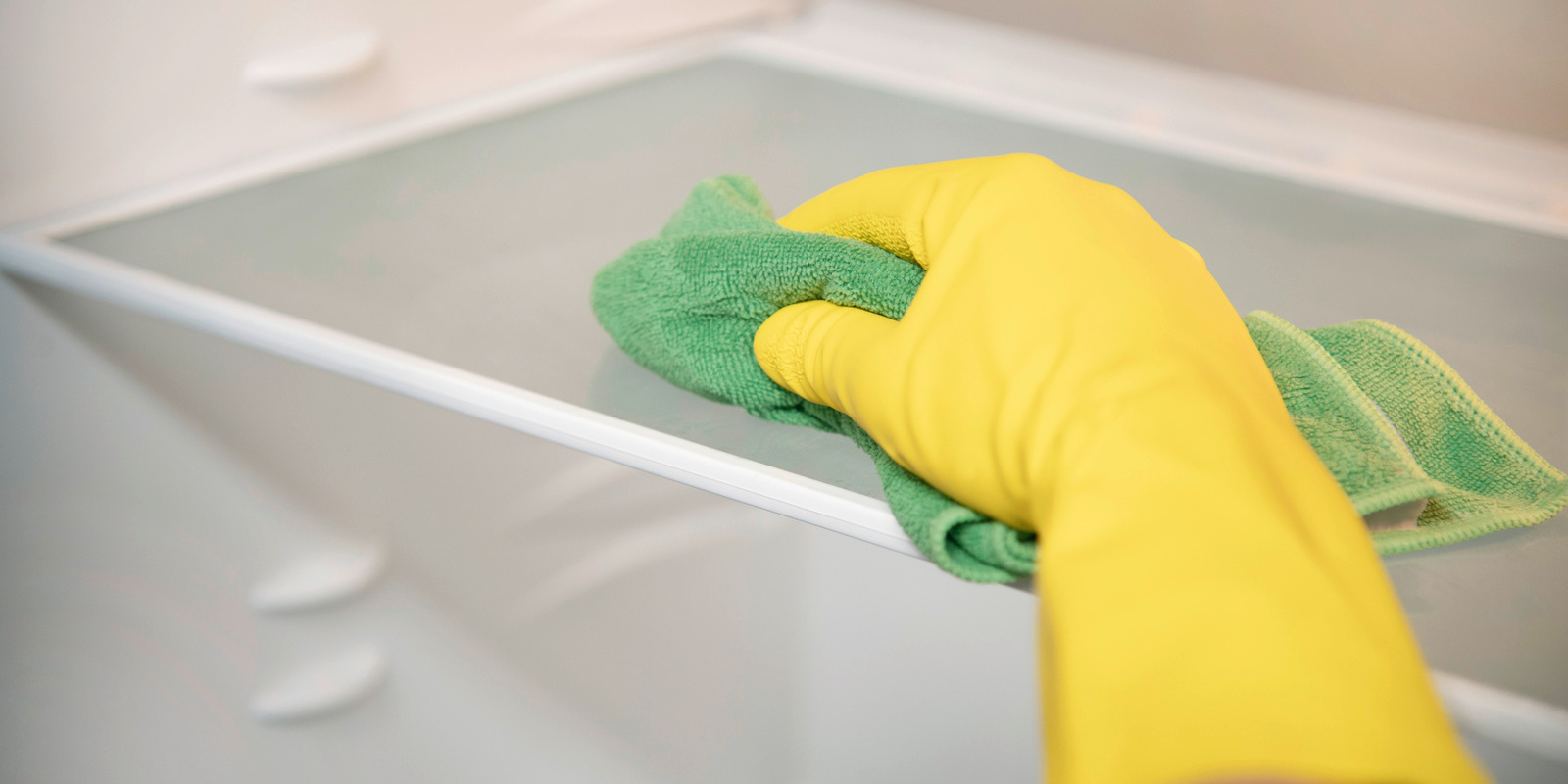
After that, it's the fridge’s turn. First, take out all the shelves and wash them with washing up liquid and warm water. Then use a clean cloth and wipe the back wall of the fridge. To prevent mould from forming, you should leave the refrigerator door open when not in use, such as during winter.
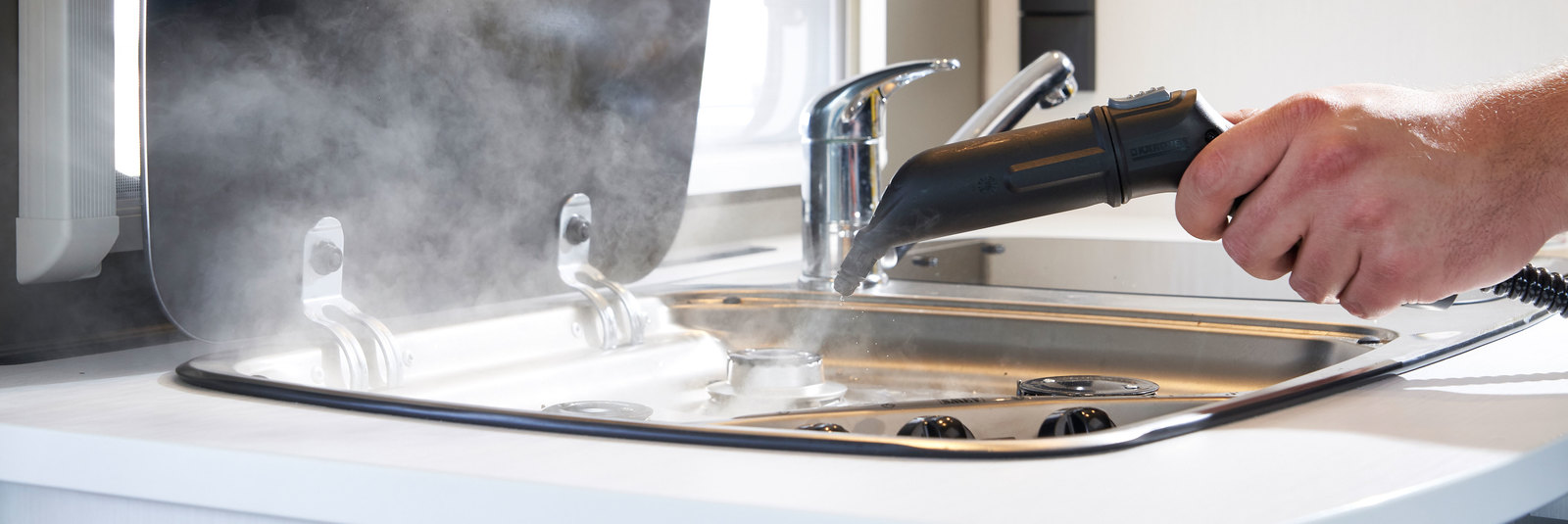
Lastly, turn your attention to kitchen counter and stove. If you lift the grate and burner caps on the gas range, you will certainly notice some degree of contamination, but this is quickly removed with a little cleaner and warm water. Limescale residue in the kitchen area can be removed with vinegar, as can clogged drains. Incrusted stains and grease residue on and around the cooktop can also be removed particularly well with a steam cleaner.
Tip
If a camper or caravan is not moved during the winter, a dehumidifier should be placed inside. This will prevent moisture from accumulating.


